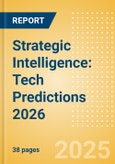To help our clients gain a competitive advantage, The analyst has developed its Strategic Intelligence Solution, a single, integrated global research platform that provides an easy-to-use framework for tracking all strategic issues-or themes-impacting all companies across all industries. Reading this report is the first step towards making better business decisions in 2026.
Key Highlights
- The global AI market will reach $642 billion in 2029, up from $131 billion in 2024, supported by a growing ecosystem of integrators, start-ups, and tech giants. To accelerate enterprise integration, pre-packaged AI agents have been developed for a wide range of applications, such as earnings analyzers, video script generators, and customer profile builders. In 2026, dozens of companies will enter the market to provide industry-specific agentic AI solutions. Despite this momentum, enterprise adoption in the coming year will continue to be held back by uncertainty about whether these tools can add demonstrable business value. Agentic AI is capable of delivering far more value than existing generative AI (GenAI) tools due to its greater autonomy and methodical approach to reasoning, problem-solving, and decision-making. The next step is crafting these agents for high-value use cases that merit substantial long-term investment.
- In 2026, quantum computing will make tangible inroads in finance and pharmaceuticals. Longstanding collaborations between quantum vendors and companies in these sectors will begin to produce operational benefits. In pharma, quantum-accelerated molecular simulations will increasingly be used to improve precision modeling, accelerate targeted and personalized drug discovery, and cut time and cost from development. Evidence of this trend includes the results of the partnership between AstraZeneca, IonQ, Nvidia, and Amazon Web Services (AWS), which showed a 20x speedup in hybrid quantum‑classical simulations of chemical transformations. In finance, quantum computing will be deployed more broadly in risk modeling, options pricing, algorithmic bond trading, and optimization tasks. Real‑world pilots will shift toward production use, encouraged by pioneering success stories such as HSBC’s work with IBM to apply quantum computing to real-world bond trading. 2026 will be the year quantum moves from experimental promise to early commercial impact in finance and pharmaceuticals.
- Nvidia has a nearly 90% market share in AI chip design. Despite successfully riding the Gen AI tidal wave thus far, Nvidia faces growing threats from competitors. OpenAI, which has almost wholly depended on Nvidia graphics processing units (GPUs) until now, has diversified its supply, making multibillion-dollar deals with Broadcom and AMD. OpenAI is purchasing 10 gigawatts (GW) of custom AI accelerators from Broadcom and 6GW of GPU capacity from AMD. Diversifying its chip supply is an astute move by OpenAI, driving market competition that will ultimately lower chip prices and incentivize new, more competitive chip designs. Nvidia’s market share will slip in 2026 as its competitors gain ground.
Report Scope
- This report identifies the top 20 tech-related themes that will impact every industry in 2026. For each theme, we offer a set of predictions, identify winners and losers, and direct you to further reading.
- These 20 themes have been classified into three categories: technology themes, ESG themes, and macroeconomic themes. In the following pages, we rank the most disruptive themes in order of importance, with artificial intelligence (AI), quantum computing, and next-generation chips as the top three themes for 2026.
Reasons to Buy
Digging deeper into our strategic intelligence content can help you answer the fundamental strategic questions for 2026:
- What are the key business risks you face in 2026?
- Which are the most important technologies to focus on in 2026?
- Who are the leading vendors for these technologies?
- Where are your competitors investing for tomorrow?
- How can you better understand your customers’ key challenges?
- What are the geopolitical risks within your supply chain?
Table of Contents
- Executive Summary
- Top Themes for 2026
- Top 20 Themes
- Glossary
- Further Reading
- Thematic Research Methodology








